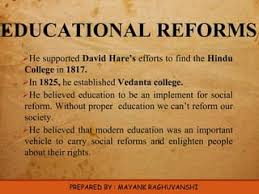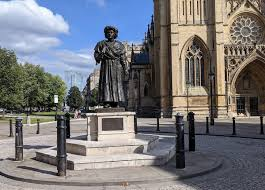Raja Ram Mohan Roy: The Father of the Indian Renaissance 20
Raja Ram Mohan Roy was born on September 22, 1772, in Radhanagore, near Calcutta (now Kolkata). He belonged to a Bengali Brahmin family, which had a rich cultural and religious heritage. His father, Ramkanto Roy, was a prominent figure in the local community, and his mother, Tarini Devi, was deeply religious, which influenced Roy’s early education and beliefs. From a young age, he exhibited a keen intellect and a thirst for knowledge, studying various subjects, including Persian, Arabic, Sanskrit, and English.
Education and Influenceshttps://www.gettyimages.in/photos/raja-ram-mohan-roy
Roy’s education was a fusion of traditional Indian and Western influences. He was exposed to the ideas of the Enlightenment, particularly through British education. His travels to various parts of India and his interactions with different communities enriched his understanding of Indian society. His quest for knowledge led him to explore various religious texts, including the Upanishads, the Bible, and the Quran. This eclectic mix of influences played a crucial role in shaping his reformist ideas.
The Social and Religious Context
The late 18th and early 19th centuries in India were marked by significant social and political upheaval. British colonial rule had brought about changes in the socio-political landscape, and many traditional practices were being challenged. In this context, social reform became necessary to address the various injustices and inequalities prevalent in Indian society. Superstitions, caste discrimination, and the status of women were issues that required urgent attention.
The Brahmo Samaj: A New Religious Movement

In 1828, Raja Ram Mohan Roy founded the Brahmo Samaj, a religious and social reform movement aimed at promoting monotheism and eradicating the ills of traditional Hindu practices. The Brahmo Samaj sought to reinterpret Hindu scriptures in a more rational light and advocated for the belief in a single, formless God. Roy emphasized the importance of reason and morality over rituals and superstitions.
The Brahmo Samaj also played a pivotal role in advocating for women’s rights. Roy was a staunch opponent of practices like Sati (the burning of widows on their husbands’ funeral pyres) and child marriage. His relentless campaigns against these practices drew both support and opposition from various quarters of society.
Advocacy for Women’s Rights
Raja Ram Mohan Roy’s commitment to women’s rights was groundbreaking for his time. He believed that the upliftment of women was essential for the overall progress of society. He campaigned against the oppressive practice of Sati and worked tirelessly to raise awareness about the importance of women’s education. In 1829, the British government, influenced by Roy’s advocacy, banned the practice of Sati, marking a significant victory for social reform.
Roy also promoted the idea of widow remarriage, which was largely frowned upon in traditional Indian society. His efforts laid the groundwork for future movements aimed at improving women’s rights in India.
Educational Reforms

Raja Ram Mohan Roy: The Father of the Indian Renaissance 20
In addition to his religious and social reforms, Raja Ram Mohan Roy was a strong proponent of education. He believed that education was the key to enlightenment and progress. He established schools that emphasized modern scientific education and the study of Western sciences alongside traditional Indian subjects. His efforts contributed to the spread of modern education in India.
Roy also founded the Fort William College in Calcutta to promote the study of Indian languages and literature. He understood the importance of language in shaping cultural identity and fostering communication between different communities.
Relationship with the British Government

Raja Ram Mohan Roy maintained a complex relationship with the British colonial authorities. He was initially supportive of British rule, believing that it could bring about positive changes in Indian society. However, as time progressed, he became increasingly critical of colonial policies that undermined Indian culture and autonomy.
His writings and public speeches often addressed issues of social justice and highlighted the need for reform within the colonial framework. He advocated for the rights of Indians and sought to promote a more equitable society. Despite his criticisms, Roy maintained a diplomatic approach, often working within the colonial system to bring about change.
Legacy and Impact
Raja Ram Mohan Roy’s contributions to Indian society were immense and far-reaching. He is often referred to as the “Father of the Indian Renaissance” due to his pioneering efforts in social reform, education, and religious revival. His ideas laid the groundwork for future reform movements in India, inspiring generations of leaders, including Swami Vivekananda, Mahatma Gandhi, and others.
Roy’s emphasis on rationality, morality, and social justice resonated with many, and his vision for a modern India influenced the nationalist movement that emerged later in the 19th century. His work in promoting education and women’s rights continues to be relevant today, as India grapples with issues of gender equality and social justice.
Conclusion

Raja Ram Mohan Roy’s life and work exemplify the spirit of reform and enlightenment. His relentless pursuit of knowledge, commitment to social justice, and advocacy for women’s rights mark him as a pivotal figure in Indian history. As India continues to evolve, the principles and ideals championed by Roy serve as a guiding light for those seeking to create a more just and equitable society. His legacy endures as a testament to the power of ideas and the transformative potential of individual action in the face of societal challenges.
